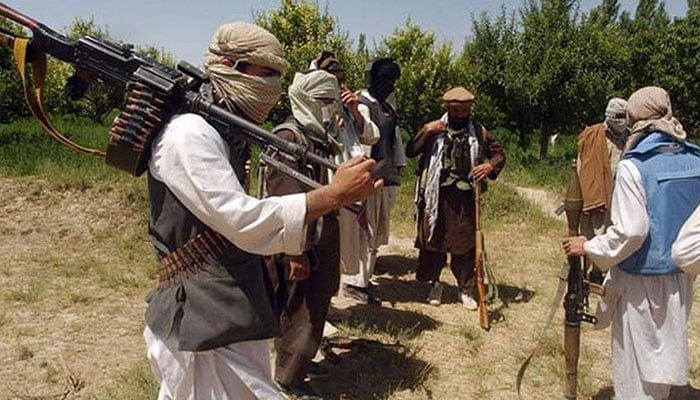Weapons concern
Unchecked circulation of advanced weaponry among non-state actors represents existential threat to regional peace
Foreign Minister Ishaq Dar’s recent visit to Kabul marks a crucial step in thawing frosty relations between Pakistan and Afghanistan. With both countries agreeing to work jointly towards peace and development, there is cautious optimism. However, this diplomatic warmth cannot obscure a matter of urgent and escalating danger: the unchecked proliferation of advanced US weapons into the hands of militant groups operating in the region. The issue is not just a bilateral concern – it is, quite frankly, a global one. Multiple credible reports now point to a disturbing pattern. The Tehreek-e-Taliban Pakistan (TTP), responsible for repeated cross-border attacks on Pakistan, is reportedly in possession of US-origin weapons that were abandoned in Afghanistan following the hasty American withdrawal in 2021. According to the BBC, of the roughly one million weapons and military equipment items captured by the Afghan Taliban, at least half are now ‘unaccounted for’. These include M4 and M16 rifles, as well as other arms with lethal capabilities. A grave concern indeed.
Despite the Afghan Taliban’s denials, reports from both the BBC and The Washington Post suggest that these weapons have found their way into the arsenals of various militant groups, including Al-Qaeda affiliates and separatist groups like the Baloch Liberation Army (BLA). The latter’s recent attack on the Jaffar Express train in Balochistan was reportedly carried out using these very weapons. This development raises fundamental questions not just for Afghanistan and Pakistan but also for the US and the wider international community. A 2022 report by the US Department of Defence confirmed that $7 billion worth of military equipment was left behind in Afghanistan. That the Afghan Taliban have refused to return these weapons – while simultaneously asking for more advanced arms to fight Daesh – is deeply troubling. The notion that terrorist organisations might now be more heavily armed than some national militaries should send shockwaves through global security institutions.
Pakistan has been raising this issue consistently at international forums. During a recent call between US Secretary of State Marco Rubio and FM Ishaq Dar, the two agreed on the need to address this weapons crisis. But statements of concern must now translate into action. It is time for the international community, particularly the US, to take urgent and coordinated steps. One proposal that deserves serious consideration is the formation of a trilateral commission comprising the US, Afghanistan and Pakistan to audit, trace and retrieve these weapons. Such a mechanism would not only demonstrate a shared commitment to curbing terrorism but also help restore some measure of accountability for the consequences of the US withdrawal. There is no room for ambiguity here. The unchecked circulation of advanced weaponry among non-state actors represents an existential threat to regional peace, national security and global stability. It is imperative that the US, together with regional players and the UN, exerts pressure on the Afghan Taliban to cooperate fully in tracing and returning this military hardware. Without such steps, talks of peace will remain hollow, and the threat posed by these weapons will continue to grow. A grave concern, yes – but one that still has a solution, if the world acts swiftly and decisively.
-
 Denzel Washington Surprises LeBron James
Denzel Washington Surprises LeBron James -
 Cillian Murphy's Hit Romantic Drama Exits Prime Video: Here's Why
Cillian Murphy's Hit Romantic Drama Exits Prime Video: Here's Why -
 Paris Hilton Reveals What Keeps Her Going In Crazy Schedule
Paris Hilton Reveals What Keeps Her Going In Crazy Schedule -
 Deep Freeze Returning To Northeastern United States This Weekend: 'Dangerous Conditions'
Deep Freeze Returning To Northeastern United States This Weekend: 'Dangerous Conditions' -
 Inside Dylan Efron's First 'awful' Date With Girlfriend Courtney King
Inside Dylan Efron's First 'awful' Date With Girlfriend Courtney King -
 'Sugar' Season 2: Colin Farrell Explains What Lies Ahead After THAT Plot Twist
'Sugar' Season 2: Colin Farrell Explains What Lies Ahead After THAT Plot Twist -
 ‘Revolting’ Sarah Ferguson Crosses One Line That’s Sealed Her Fate As Well As Andrew Mountbatten-Windsor’s
‘Revolting’ Sarah Ferguson Crosses One Line That’s Sealed Her Fate As Well As Andrew Mountbatten-Windsor’s -
 AI Rivalry Heats Up As Anthropic Targets OpenAI In Super Bowl Ad
AI Rivalry Heats Up As Anthropic Targets OpenAI In Super Bowl Ad -
 Kate Middleton, Prince William Share Message Ahead Of Major Clash
Kate Middleton, Prince William Share Message Ahead Of Major Clash -
 Is Dark Matter Real? New Theory Proposes It Could Be Gravity Behaving Strangely
Is Dark Matter Real? New Theory Proposes It Could Be Gravity Behaving Strangely -
 Viral AI Caricature Trend: Is Your Personal Data Really Safe?
Viral AI Caricature Trend: Is Your Personal Data Really Safe? -
 Lil Jon’s Late Son, Nathan Smith Spoke Highly Of His Father Before His Tragic Death
Lil Jon’s Late Son, Nathan Smith Spoke Highly Of His Father Before His Tragic Death -
 China Boosts Reusable Spacecraft Capabilities By Launching For The Fourth Time
China Boosts Reusable Spacecraft Capabilities By Launching For The Fourth Time -
 Bianca Censori On Achieving 'visibility Without Speech': 'I Don't Want To Brag'
Bianca Censori On Achieving 'visibility Without Speech': 'I Don't Want To Brag' -
 Skipping Breakfast? Here Are Some Reasons Why You Shouldn't
Skipping Breakfast? Here Are Some Reasons Why You Shouldn't -
 'Concerned' Prince Harry Future Plans For Lilibet, Archie Exposed
'Concerned' Prince Harry Future Plans For Lilibet, Archie Exposed




